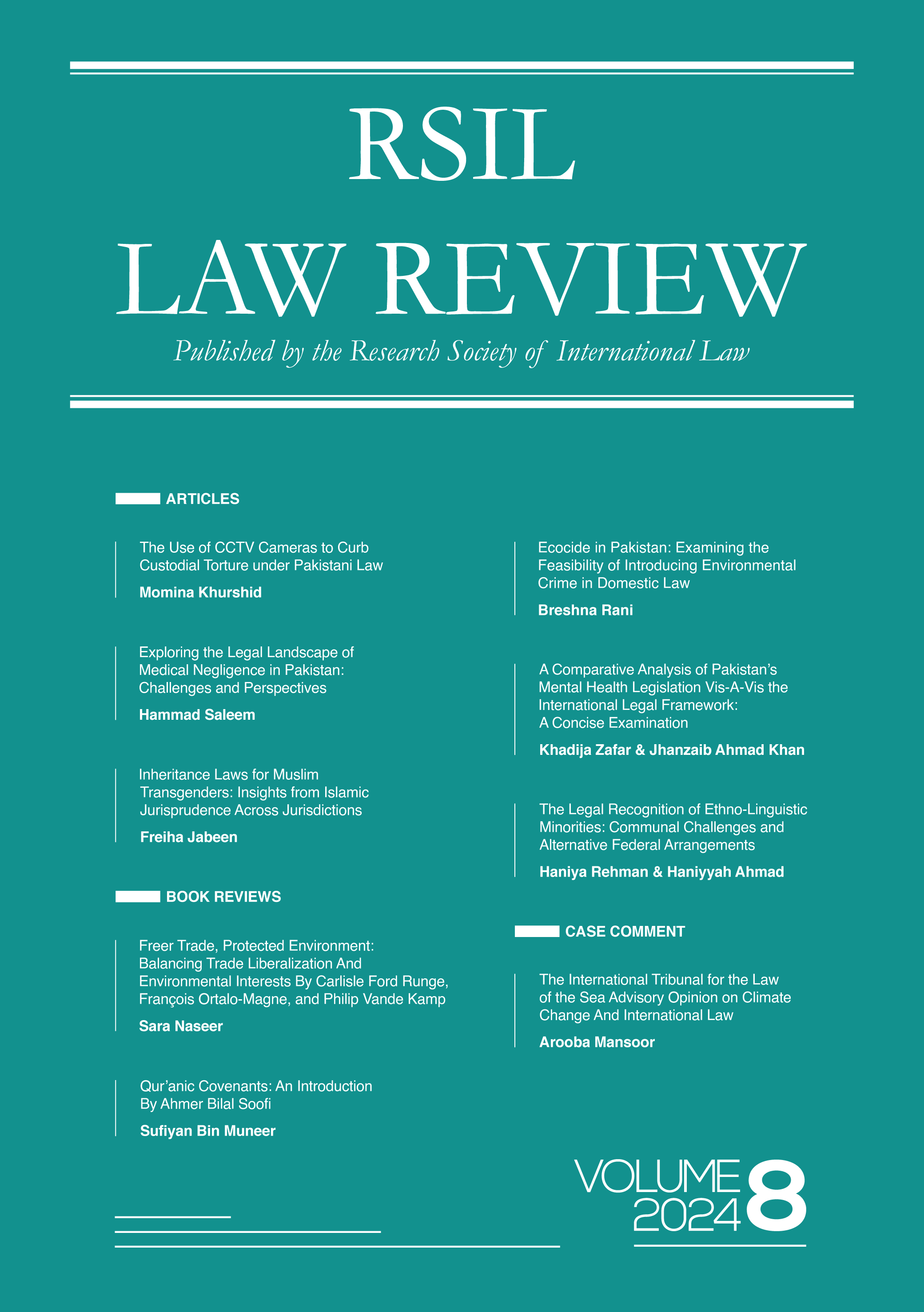RSIL Law Review Volume 5, 2021 - Articles
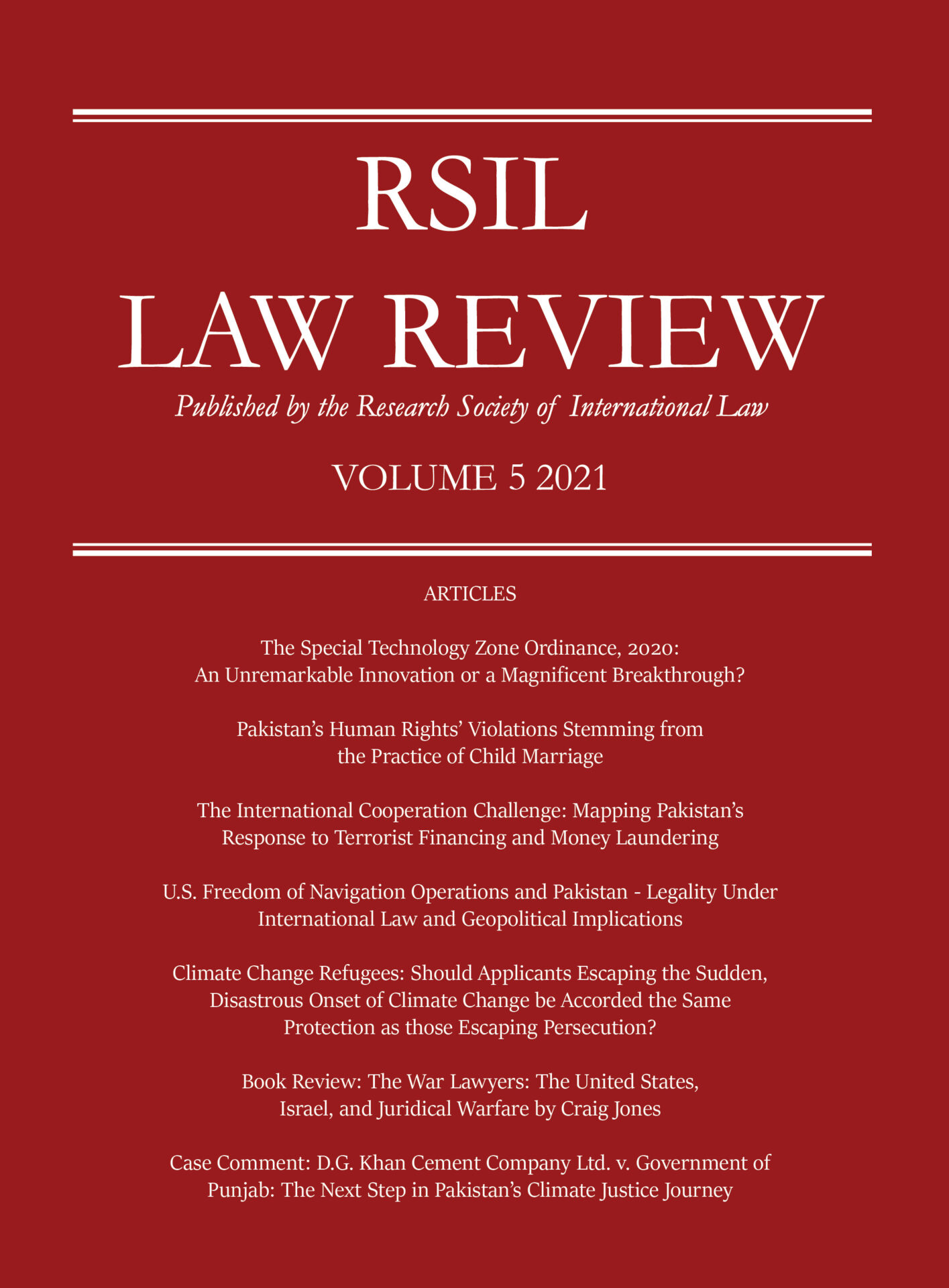
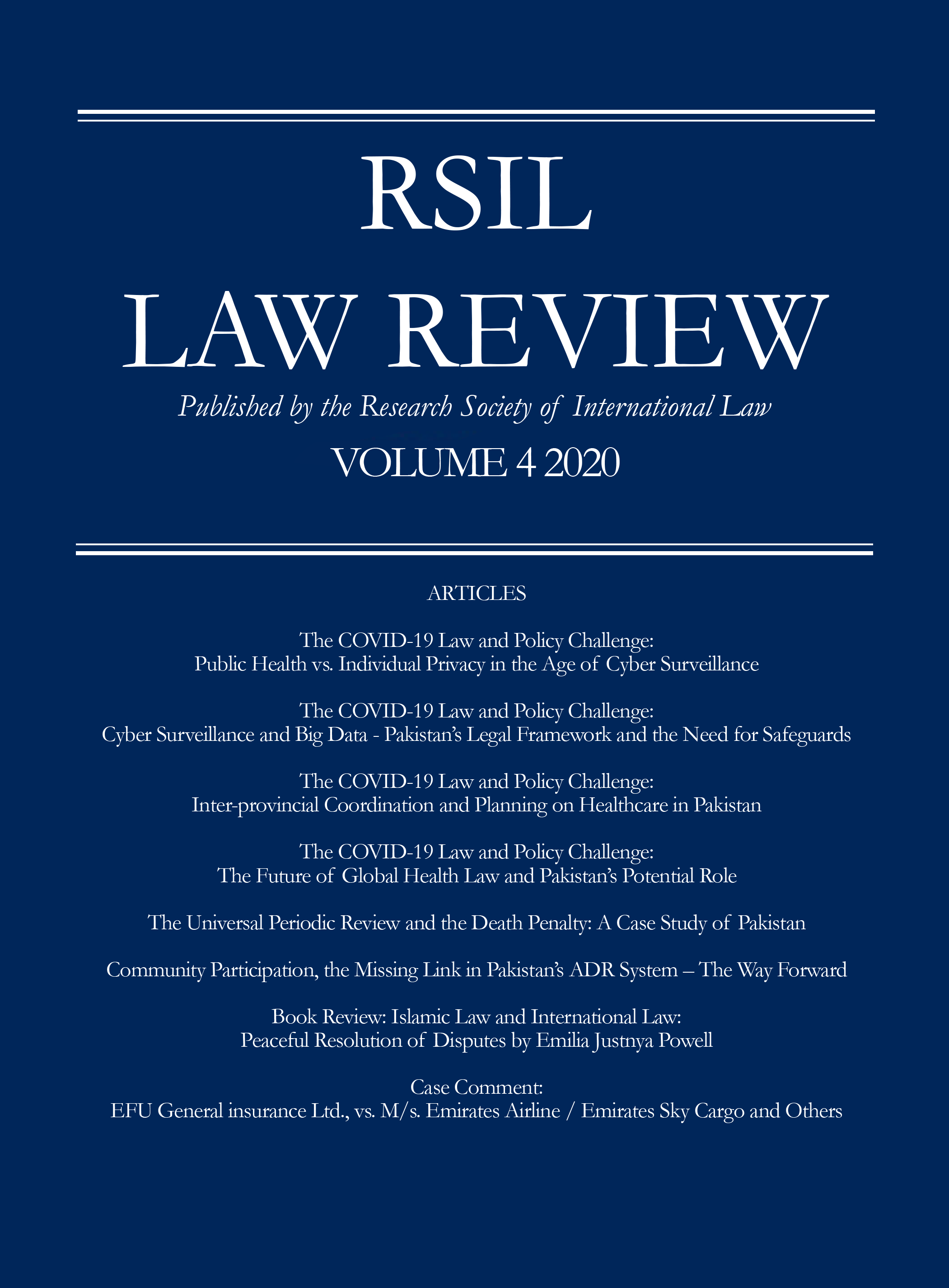
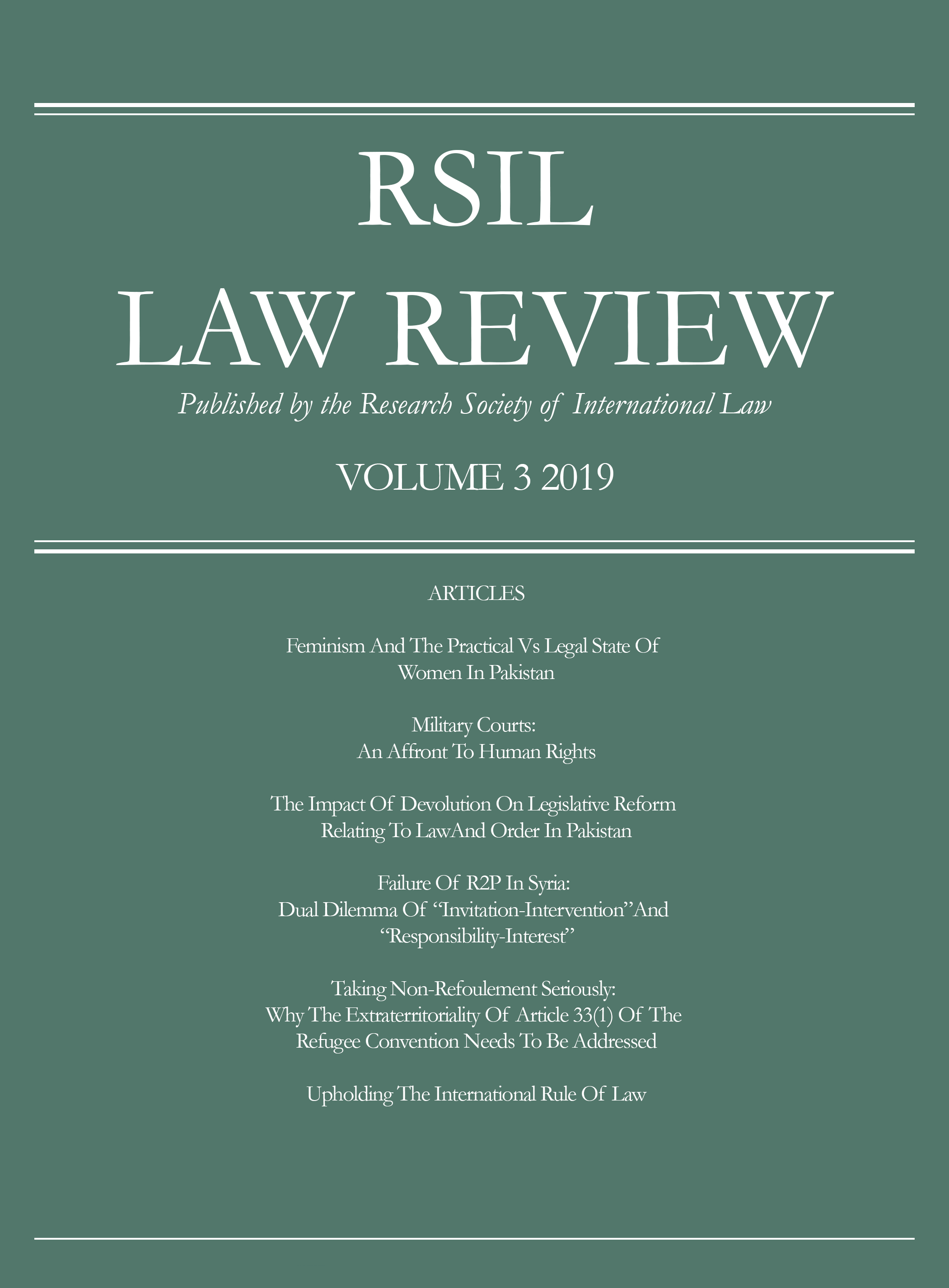
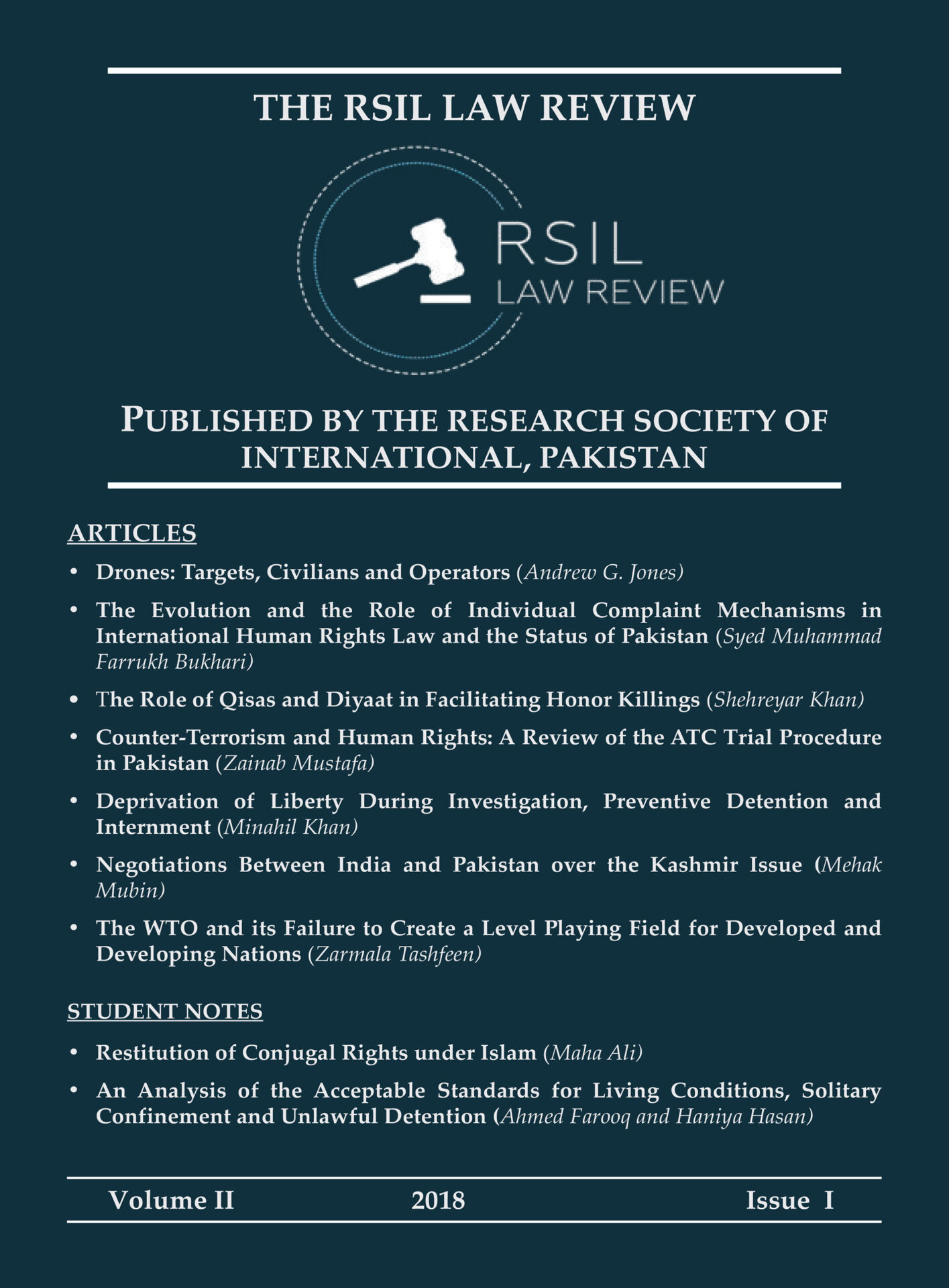
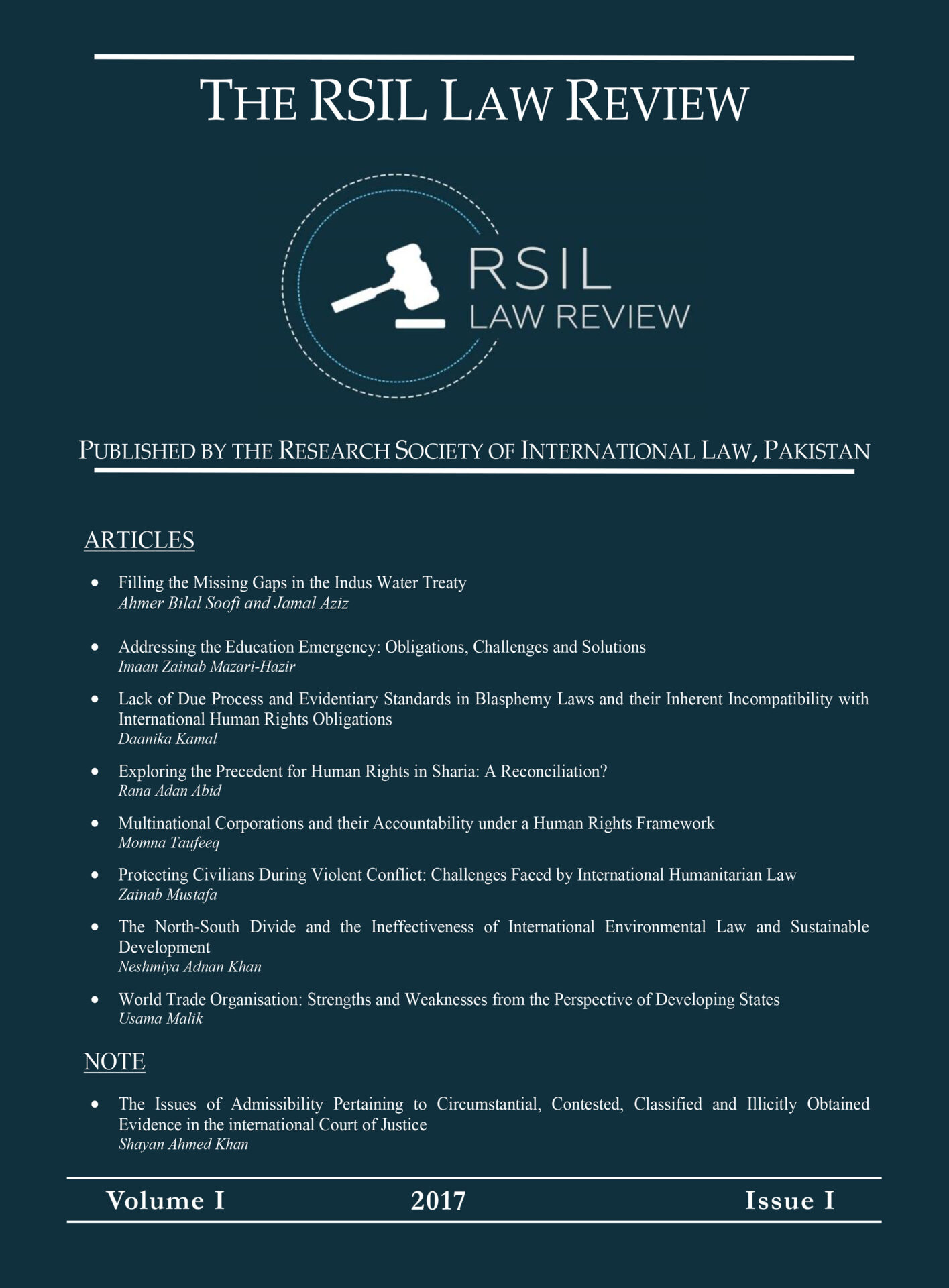
Aman Rehan | Hammad Ali Kalhoro
ABSTRACT: This legislative review discusses the Special Technology Zone Ordinance, 2020, the promulgation of which was publicized as the harbinger of a new era in the realm of technology and innovation in Pakistan, as well as its potential as a source of foreign direct investment. It will do this by carrying out a brief discussion of the theoretical framework surrounding Special Technology Zones (STZs), followed by a subsequent section on factors which may impact the performance of this initiative. Additionally, specific provisions of the Ordinance will be highlighted regarding topics such as definitional ambiguities and dispute resolution mechanisms. Lastly, a comparative analysis will be conducted to derive best practices adopted by foreign jurisdictions to ensure effective functioning of STZs. As this is a relatively nascent legal regime in Pakistan, the aim of this paper is to briefly highlight some policy considerations to ensure an effective legal and regulatory environment exists for STZs, so that they do not suffer the same fate as that of Special Economic Zones which have been established in the past.
Pakistan’s Human Rights’ Violations Stemming from the Practice of Child Marriage
Saleha Tauqeer
ABSTRACT: Child marriage is among the gravest human rights issues in the world. Every year, 12 million girls below the age of 18 are married. According to the Pew Research Centre, a minimum of 117 countries in the world allow child marriages. Among the countries where the practice of child marriage persists today is Pakistan. Pakistan has introduced federal and provincial legislations penalizing child marriages. However, the law has proved to be an ineffective mechanism to prevent the practice of child marriage, which remains a prevalent practice in Pakistan. According to UNICEF, Pakistan ranks sixth in the world for the highest number of child brides, with a total of 1,909,000 child brides. The gravity of the issue can be highlighted from the fact that girls as “young as seven or eight” are forced into marriages.
While child marriages have serious implications for children given in marriage, the issue is exacerbated by the fact that intimate partner violence is a common phenomenon in Pakistan, impacting over “one-third of the population”. This paper will examine the legislation dealing with child marriages in Pakistan, identify how the said legislation is inconsistent with international human rights standards as well as the violations of children’s rights resulting from child marriages. Moreover, this paper will make recommendations for curbing the practice of child marriage in Pakistan.
Noor Fatima Iftikhar | Saman Iqbal
ABSTRACT: The paper aims to dissect the gaps and challenges in Pakistan’s international cooperation framework centred around terrorist financing (TF) and money laundering (ML). Since Mutual Legal Assistance (MLA) is a relatively new concept for the law enforcement agencies in the country, its application poses considerable difficulties. The element of reciprocity is at the heart of MLA; therefore, the formal and informal channels of international cooperation form the basis for curbing transnational crime. Pakistan’s existing risk assessments point to an elevated risk of TF/ML as funds are generated both at home and in foreign countries for funding or otherwise supporting terrorist organizations and terrorist operations within the country and abroad. The challenge to trace financial links for moving TF funds in or out of the country include large undocumented/informal economy, extensive use of cash, significant illegal hawala/hundi activity, use of cash couriers, Pakistan’s geographical landscape with porous borders and the existence of Afghan refugees in the country.
Syed Mubashar Ali Shah Rizvi | Syed Qasim Abbas
ABSTRACT: The United States has been using its Freedom of Navigation Program to challenge interpretations and reservations of various states with regards to the United Nations Convention on the Law of Seas. This article assesses the credibility of these operations under International Law from the perspective of South Asian states, namely Pakistan, China, and India.
The article begins by introducing the Convention on the Law of Seas and reservations made to this Convention by South Asian states. It then uses FONOPs data for the past three decades to highlight the U.S. stance on interpretations of the Convention on the Law of Seas. The article then examines the reservations and state practice of the South Asian States to build a case for a regional custom in favour of seeking prior permission before conducting war manoeuvres in the EEZ and territorial waters.
Finally, the paper explores the possible geo-political consequences of continued U.S. FONOPs in the Indian Ocean considering the future U.S.-China battle for global supremacy.
Aimen Taimur
ABSTRACT: In the face of imminent mass displacements induced by climate change, the current legal regime for refugee protection fails to preserve the rights of individuals escaping climate disasters. This is due to the normative requirement that applicants seeking refugee status must be escaping ‘persecution’. Since those escaping climate change do not satisfy the traditional rubric of persecution, it has been argued that refugee status would not apply to applicants seeking protection from the effects of climate change. There is disagreement among academics on whether ‘CCRs’ (climate change refugees) should be accounted for in a separate category under Article 1A(2) of the Refugee Convention 1951. This paper will analyse whether disaster-motivated escape is adequately similar to ‘persecution’ so that victims of climate change induced displacement may be considered refugees under the Convention. Moreover, it will assess whether international regimes, procedurally and substantively, provide redress for CCRs.
Book Review: The War Lawyers: The United States, Israel, and Juridical Warfare by Craig Jones
Aimen Taimur
RSIL Law Review Volume 4, 2020 - Articles
Jamal Aziz | Ayesha Malik | Noor Fatima Iftikhar
ABSTRACT: Cyber-surveillance is increasingly being used by desperate governments seeking to curb the rising figures of those infected with coronavirus. States are investing in and rolling out smartphone apps to track citizens’ movements, trace locations and map outbreaks in a bid to tackle COVID-19. While not without its benefits, the proliferation of cyber surveillance raises important concerns regarding health rights and privacy of ordinary citizens. This paper explores these concerns and the legality of these measures as well as the issues with their particular application in the Pakistani context.
Oves Anwar | Ayesha Malik | Abraze Aqil | Noor Fatima Iftikhar
ABSTRACT: The outbreak of the novel coronavirus has led to the adoption and implementation of new technologies to achieve public health outcomes. While useful, the mass surveillance and collection of data has resulted in heightened concerns regarding the sanctity of data rights and privacy. This paper considers the legislation which provides cover for these measures and the potential legal issues raised by their use. It recommends striking a balance between the benefits of surveillance for the protection of individual’s health with their right to privacy.
Jamal Aziz | Mehreen Naushad | Shayan Ahmed Khan | Zoha Shahid
ABSTRACT: The SARS-CoV-2 (COVID-19) outbreak has highlighted the need for better inter-provincial coordination and planning within Pakistan’s devolved system of Government. The devolution of certain powers to provincial governments through the 18th Amendment has had a significant impact on Pakistan’s healthcare management systems. This paper explores the challenges of governance, service delivery, health information and policy coordination at federal and provincial levels.
The COVID-19 Law and Policy Challenge: The Future of Global Health Law and Pakistan’s Potential Role
Jamal Aziz | Hira Arif | Noor Fatima Iftikhar
ABSTRACT: The management of the novel coronavirus has raised key questions regarding whether the international health law regime is able to adequately handle an outbreak of this magnitude. The structure and framework applicable to the international health law as well as the World Health Organization’s constitution will be explored in this paper. The criticisms heaped on to the WHO and this framework for being ineffective and unable to deal with this outbreak will be considered. The paper will also identify ways in which the regime may be improved to effectively counter pandemics and other health emergencies, and will contextualise this within the ambit of Pakistan.
The Universal Periodic Review and the Death Penalty: A Case Study of Pakistan
Amna Nazir
ABSTRACT: Acclaimed as an innovative mechanism of the UN Human Rights Council, the Universal Periodic Review (UPR) was introduced by General Assembly Resolution 60/251 in 2006. It appraises the human rights record of each UN Member State, every four and a half years, in an attempt to further the global promotion and protection of human rights. The third cycle of the UPR has been underway since April 2017 and will conclude in November 2021. Using Pakistan’s latest review, held in 2017, as a case study, this article assesses the mechanism’s engagement with the question of the death penalty. In doing so, it evaluates each stage of the process and considers the extent to which this violation of the right to life is challenged and issues recommendations to strengthen the integrity of the UPR.
Community Participation, the Missing Link in Pakistan’s ADR System – The Way Forward
Dr. Usman Hameed
ABSTRACT: Alternate Dispute Resolution (ADR) plays a vital role in serving the interests of justice, especially when people start to lose faith in the formal justice system due to the slow pace and ever-increasing cost of the latter. The primary objective of ADR was to supplement the regular courts in minimizing the backlog of cases. However, its ultimate beneficiaries turned out to be the poor and the disadvantaged, as it provided them with a forum to resolve their disputes informally through mutual understanding, without hiring expensive attorneys and waiting needlessly to get their cases heard by the regular courts.
Responding to the acute need for alternate methods of dispute resolution, Pakistan adopted several ADR enabling laws. This paper will suggest that the laws in question may not bring about the desired results, as they promote state driven, instead of community-driven ADR. The reason for the success of ADR in developing countries like Bangladesh has been due to the involvement of the local community and consequently the idea of a state driven ADR goes against its true spirit.
The purpose of this paper is to address the current loopholes in ADR-related laws in the country and to suggest possible reforms.
Bushra Khan
Case Comment: EFU General insurance Ltd., vs. M/s. Emirates Airline / Emirates Sky Cargo and Others
Mehreen Naushad
RSIL Law Review Volume 3, 2019 - Articles
Feminism And The Practical Vs Legal State Of Women In Pakistan
Saleha Tauqeer
ABSTRACT: Women in Pakistan have a disadvantaged position in the society. Whether one considers familial and interpersonal relationships, the participation and representation of women in the public sphere, women’s access to education and employment opportunities or the extent to which they are protected from violent crimes such as rape, domestic violence, or harassment etc., it would seem that the state of women in Pakistan is deplorable. Attempts to empower women are resisted by religious and cultural interpretations of women’s role and position in society, as well as misinterpretations of religious principles and misogynistic attitudes towards women. Furthermore, feminism is perceived as a western concept that will break down
the religious and moral fabric of the society and is often confused with misandry. Lack of knowledge of feminism and misunderstandings about the concept have resulted in a lot of opposition towards any local feminist movements and the ideas that feminists attempt to promote.
Therefore, this essay attempts to briefly explain the three waves of feminism and the various rights that these movements have focused on. It then examines the state of women’s rights in Pakistan, including the right to vote, the right to political representation and the right to use birth control. It explores the restrictions on women’s access to education and employment as well as the roles that are attributed to women by society and the way they contribute to the exploitation of women. The essay further focuses on the issue of violence against women and the intersectional dimension of women’s lives. The essay also focuses on the ways that women in Pakistan can be empowered and identifies changes in legislation and societal attitudes as well as proper administration of justice as viable solutions to improving women’s condition in Pakistan.
Military Courts: An Affront To Human Rights
Seemal Hameed
ABSTRACT: The Peshawar School Attack tragedy saw in its wake the establishment of military courts, which allow for the prosecution of civilians accused of terrorism offences. However, what was initially intended to be a short-term solution, four years ago, is still in existence today. Presently, the PTI government is again making efforts to extend the military courts for a period of another two years. This article sheds light upon how these courts deal a severe blow to the integrity of our criminal justice system which also exercises jurisdiction over offences for terrorism. Additionally, concerns have also been raised with regards to Pakistan’s obligations under a multiplicity of International Conventions.
The Impact Of Devolution On Legislative Reform Relating To Law And Order In Pakistan
Jamal Aziz | Minahil Khan
ABSTRACT: In April 2010, the 18th Amendment to the Constitution of Pakistan was passed whereby the Concurrent Legislative List was abolished and with a few additions to the Federal Legislative List, all remaining areas were devolved to the Provinces. This paper looks at the impact of the devolution of powers with regards to legislative reform for law and order in Pakistan. In doing so, it highlights the background to the 18th
Amendment especially in terms of Pakistan’s commitment towards the law and order situation, the constitutional framework that underpins the 18th Amendment and also the different judicial mechanisms available to reconcile Federal and Provincial legislation relating to law and order.
Failure Of R2P In Syria: Dual Dilemma Of “Invitation-Intervention” And “Responsibility-Interest”
Awais Zahid Abbasi
ABSTRACT: After eight years of crises and 11 vetoes in the UNSC, the world community has so far failed not only to find a peaceful solution to end the conflict but also to protect the civil population of Syria from mass atrocities. Rather than finding a solution to this crisis, cold-war rivals; United States and Post-Soviet Russia, have made Syria as their “Power-projection ground” by pulling-in other developing neighboring states to the conflict. On one side, some are invited into the conflict by the host state and on the other side, some are intervening on the grounds of “Responsibility to Protect (R2P)”. This ongoing situation has raised serious questions on the principles of R2P and has identified numerous loopholes that allow powerful states to manipulate the principles in their favor. This manipulation in result creates the dual-dilemma of ‘Invitation-Intervention’ and ‘Responsibility-Interest’ leading to the failure of R2P.
Fatima Mehmood
ABSTRACT: This article critically analyses the uncertainty surrounding the extraterritorial application of the non-refoulement obligation as incorporated in Article 33(1) of the Refugee Convention 1951. In doing so, it engages in a comparative critique between the restrictive interpretation afforded to the provision by the United States Supreme Court and the liberal reading of the text by the European Court of Human Rights. The polarised interpretations adopted by these adjudicative bodies highlight the ambiguity in the text of Article 33(1) and consequently, its susceptibility to arbitrariness and abuse. Therefore, this article proposes an incremental reform in two phases, beginning with reforming the text of Article 33(1) itself to bring it into line with the liberal reading of the text as it stands. In the second phase, the establishment of an independent international Judicial Commission is concerned, tasked with ensuring convergence in the interpretation of the revised text of Article 33(1).
Upholding The International Rule Of Law
Hira Arif Riar
ABSTRACT: The Higher Judiciary in Pakistan, has occasionally referred to international law treaties and instruments when resolving issues that have some relevance with international law. These references were predominantly drawn from private international law as in majority of these cases, the international law of arbitration was referred to and discussed. Related concepts like sales of goods, international letter of credit were the most leaned upon areas of international law but this was predominantly what we referred to as the ‘private international law basket’. Seldom, references from public international law domain were also discussed but the only area that attracted attention from public international law was the law of human rights; in-fact one notices frequent references to the United Nations Human Rights Declaration (UNDHR), International Covenant of Civil and Political Rights (ICCPR) and other HR instruments when the courts were seized on matters relating to the interpretations of fundamental rights provided under all the Constitutions of Pakistan including the 1973 Constitution. However, recently the Superior Courts have shown more interest in other areas of international law such as the ‘use of force’, interpretation of the UN Charter, particularly in light of the implementation of Chapter VII, the law of conflict and some UNSC resolutions. This article examines and maps the recent and novel trend of the judiciary’s reliance upon principles of public international law; in-fact their judgments cover large swaths of the legal landscape from intellectual property law to environmental law to international trade law.
RSIL Law Review Volume 2, 2018 - Articles
Drones: Targets, Civilains and Operators
Andrew G. Jones
The Evolution and the Role of Individual Complaint Mechanisms in International Human Rights Law and the Status of Pakistan
Syed Muhammad Farrukh Bukhari
The Role of Qisas and Diyaat in Facilitating Honor Killings
Shehreyar Khan
Counter-Terrorism and Human Rights: A Review of the ATC Trial Procedure in Pakistan
Zainab Mustafa
Deprivation of Liberty During Investigation, Preventive Detention and Internment
Minahil Khan
Negotiations Between India and Pakistan Over the Kashmir Issue
Mehak Mubin
THE WTO and its Failure to Create a Level Playing Field Between Developed and Developing Nations
Zarmala Tashfeen
Student Notes:
Restitution of Conjugal Rights Under Islam
Maha Ali
An Analysis of the Acceptable Standards for Living Conditions, Solitary Confinement and Unlawful Detention
Ahmed Farooq | Haniya Hasan
RSIL Law Review Volume 1, 2017 - Articles
Filling the Missing Gaps in the Indus Water Treaty
Ahmer Bilal Soofi | Jamal Aziz
Addressing the Education Emergency: Obligations, Challenges and Solutions
Imaan Zainab Mazari-Hazir
Lack of Due Process and Evidentiary Standards in Blasphemy Laws and their Inherent Incompatibility with International Human Rights Obligations
Daanika Kamal
Exploring the Precedent for Human Rights in Sharia: A Reconciliation?
Rana Adan Abid
Multinational Corporations and their Accountability Under a Human Rights Framework
Momna Taufeeq
Protecting Civilians During Violent Conflict: Challenges Faced by International Humanitarian Law
Zainab Mustafa
The North-South Divide and the Ineffectiveness of International Environmental Law and Sustainable Development
Neshmiya Adnan Khan
World Trade Organization: Strength and Weaknesses from the Perspective of Developing States
Usama Malik
Note
The Issues of Admissibility Pertaining to Circumstantial, Contested, Classified and Illicitly Obtained Evidence in the International Court of Justice
Shayan Ahmed Khan
We are pleased to announce the publication of Volume 8 (2024) of the RSIL Law Review! Click here to access the Volume.
Subscription and Payments
The RSIL Law Review is available digitally on HeinOnline and on this website. Hard copies of the Law Review may also be purchased using this form:
About the RSIL Law Review
The RSIL Law Review is a journal of international law academia published by the Research Society of International Law (RSIL). It endeavors to be one of the leading law journals in Pakistan. The Review is committed to publishing unique, cutting edge and high impact pieces from new scholars likely to advance public debate in international, domestic and comparative law. It reinforces RSIL’s desire to sustain and strengthen critical learning, capacity building and legal expertise in Pakistan.
The Research Society of International Law (RSIL) is a private sector research and policy institution based in Pakistan. Founded in 1993, by Mr. Ahmer Bilal Soofi, RSIL’s mission is to conduct research on the intersection between international law and the Pakistani legal context. Today, it is the largest legal think-tank in Pakistan with a highly qualified research staff, possessing a broad spectrum of specializations in both international and domestic law. RSIL engages in academic research, policy analysis, and capacity building in order to inform the discourse on issues of national and international importance from a legal perspective and to bring out a positive effect in the domestic legal space.

